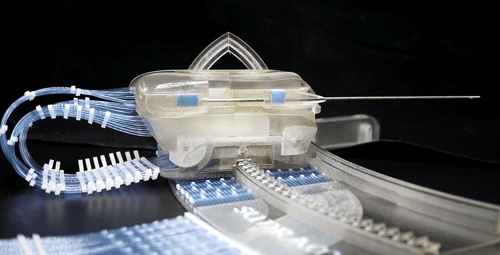Sensors play crucial leading role in exponential development of AI

If sensor technology does not grow at the same exponential rate as computing power, we will not be able to take full advantage of the opportunities offered by AI, argues TUE Fellow Carlo van de Weijer. This is because without accurate, preferably real-time, data, the unconditioned outside world cannot be understood by AI. Given the AI era in which we currently find ourselves, the integration of sensors is, in that sense, much more critical than the quality of actuators.
Carlo van de Weijer also sees it happening: the hype around artificial intelligence. 'Some start-ups only say they are involved with AI to raise more money,' says the director of the Eindhoven AI Systems Institute (EAISI) at Eindhoven University of Technology. He compares the situation to how the internet was viewed some 30 years ago. 'Everyone would say that you had to get online, but no one knew exactly how or what it involved, so in practice not much happened. We now know how transformative this technology has been. Right now, AI is a big topic of conversation because we visualise machines becoming smarter than ourselves in the foreseeable future. We have to get to grips with this.’
Van de Weijer backs up his statement with three arguments. 'To begin with, technological advances, and the associated growth in computing power, are relentless. There is no reason why these advances should stop,’ Van de Weijer says.
Bag of algorithms
The second reason is that the development of AI isn't limited to human intelligence. 'Our brains are limited to a single cranium with a clock speed a million times slower,' Van de Weijer explains. 'If we cooperate with machines, we'll become more intelligent and can postpone the moment when computers surpass human computing power. But humans have evolved whereas machines have not.’
Doesn't that put people at an advantage, because they have consciousness, character, humor, or a soul? This question brings Van de Weijer to his third argument: ‘That raises a philosophical discussion. Can a machine ever enjoy a piece of chocolate? We can, but isn't that only because we’ve learned that chocolate gives us energy? I admit it's not the most romantic way to look at a human being, but are we in fact also nothing more than a bag of algorithms? Even if there is some difference between human consciousness and AI, I don't think that's going to give us an edge.
What is intelligence?
How long it will take before AI surpasses human intelligence - the so-called singularity point - is a bone of contention among scientists. The well-known futurist Ray Kurzweil states in his book "The Singularity Is Nearer" (2024) that we will reach that point as early as 2029. Others believe it will happen somewhere around 2055-2060. ‘Whichever is more likely, there are very few scientists who still say it's never going to happen,’ says Van de Weijer, who points out that AI could have enormous impact much sooner. 'We can already see it happening.'
To properly categorize the level of artificial intelligence, we must first define intelligence. Van de Weijer likes to use the description used by American psychologists Robert Sternberg and William Salter. 'They refer to intelligence as 'goal-directed adaptive behavior'. In classical automation, you start with an input. It is sent to a program, which generates output. Many things that are referred to as AI are actually nothing more than this. In my opinion, something should only be called AI if you can give the input, define the output, and you let the machine decide for itself how to get there. If the output is unsatisfactory, real AI can repeatedly modify the program, until the output is correct.'
Sensors crucial for AI
For Van de Weijer, there is another important reason why the interest in AI has exploded so much in recent years: sensorics. 'Computing power is evolving exponentially. When something develops exponentially, people always underestimate it because we’re linear thinkers,’ he explains. 'Many systems can be reduced to a sensor that measures something, some computational power or a bit of common sense that draws a conclusion based on the measured data and then issues a command to an actuator. A feedback loop oversees this to assess whether the action does indeed provide better measurement. That's how a system iterates toward the right outcome.'
Actuators are obviously improving, Van de Weijer admits. ‘The performance of components such as electric motors, pistons, hydraulic systems, etc. improves every year. ‘However, this development is linear, not exponential.' This contrasts with improvements in sensors, Van de Weijer argues: 'They benefit from Moore's Law, just like available computing power. Look at cameras, lasers, lidars. These kinds of technology are initially very expensive, but they become smaller incredibly fast, and much cheaper too. At a certain point, it even goes on-chip. It's a tremendously fast process.'

EAISI Director Carlo van de Weijer: 'Start experimenting with AI; it will almost certainly make you more productive,' Photo: Bart van Overbeeke
Blame it on the sensors
The fact that sensors are developing much faster than actuators is good news for AI, Van de Weijer believes. To clarify this point, he gives an example: 'Try driving a car while wearing a blindfold. It isn't going to work. However, if the steering mechanism isn't quite right, you can still avoid all kinds of objects. As long as you get the right data, you can still solve various things. However, no data or the wrong data leaves you with a serious problem.
Sensors are therefore key players in the development of AI. If computing power alone was growing exponentially, things wouldn’t be changing anything like as fast, Van de Weijer asserts. But because sensor technology is also developing exponentially, and sensors are increasingly being integrated in smarter ways, AI algorithms continue to receive the right - and sufficient - data, allowing the intelligence to continue to develop exponentially.
Unconditioned world
AI places conditions on the data it receives through sensors, but what those conditions are exactly is very unpredictable. 'As a sensor supplier and integrator, you will have to deal with that adequately and decisively,' Van de Weijer says. 'You can't make the world predictable. That would be beneficial for AI, because artificial intelligence performs especially well in a conditioned world. But then you'd have to put traffic lights everywhere, regulate the weather, you name it, and that's obviously not possible. You can make AI work in the unconditioned, real world only if you know the conditions of that world in real time. That's the bottom line.' And that requires well-integrated sensors.
Start experimenting
As mentioned, even AI evangelist Van de Weijer feels that sometimes there are a lot of pie-in-the-sky promises when it comes to AI. 'I don't believe AI is going to replace humans, but I do think that the people who work with AI are going to replace the people who don't work with AI. That’s because AI makes you comprehensively more productive. We need that effectiveness boost to ensure the growth in prosperity stays on course.'
That is why the EAISI director is not in favor of banning the use of ChatGPT in schools, for example. Indeed, he urges everyone to get to work with AI tools. ‘Just ask ChatGPT what tools might be of interest to your field,’ he smiles. 'And start experimenting. It will almost certainly make you more productive. Humans are different from other animals because we use tools, and share them with each other to further develop and improve them. Until now, these were tools that supported our arms or legs, but with AI we now have tools that help our brains. This is a development that cannot be stopped, so you just have to make the best of it. Sensors are an integral part of this.'
Stay ahead in sensor innovation
In a world where technology is developing at lightning speed, it is difficult to stay up-to-date. Want to keep up with the latest developments in sensor technology? Our newsletter gives you a head start.
Through our monthly newsletter, you will receive technology blogs, news, trends and background stories in your mailbox. Sign up now and discover what sensor technology has in store for the future!




